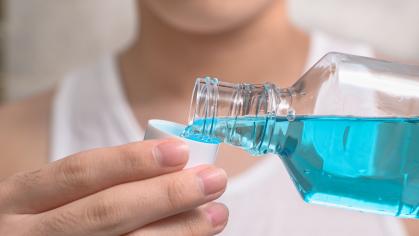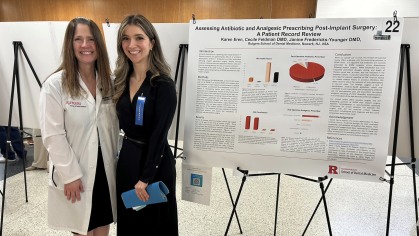Connecting the Dots
Research is an endless quest. That’s why it has always fascinated Georgios Kotsakis. The moment he figures out an answer, he feels a new question he needs to creatively tackle pops up.
“It’s a constant process of evolution, understanding, and discovery,” he said. “That's very gratifying.”

An experienced researcher with over 100 peer-reviewed articles and textbook chapters with over 20,000 citations of his work, Kotsakis has been named the new assistant dean for clinical research and director of research at Rutgers School of Dental Medicine (RSDM). He is also the school’s newest professor of oral biology. Prior to joining RSDM, Kotsakis was an associate professor of periodontics, and the Roland Meffert Endowed professor in implant dentistry at University of Texas Health San Antonio.
In his new role, Kotsakis will help establish a structure connecting researchers, experiences, and tools to create strong research teams at Rutgers and beyond. He also aims to mentor and groom the new generation of researchers. “All the foundational components for clinical research excellence are present now,” he said. “My vision is for Rutgers is to be the number one clinical and translational research institution in the Northeast and nationally.”
RSDM has state-of-the-art research facilities, experienced scientists working across different branches of oral biology, and strong clinical researchers with a large patient population pool—all of which drew Kotsakis. “Dean [Cecile] Feldman has built an amazing clinical research infrastructure that's highly attractive to both federal and industry sponsors,” said Kotsakis. “I always strive to be in places where there's an upswing, and I feel like the trajectory at RSDM is impressive. Nothing is stagnant here. People just want to put in more grants and excel.”
Like he will be connecting dots in the Office of Research for more fruitful projects, his work as a scientist does the same. Kotsakis’s own line of research focuses on periodontal disease and implants, and he does translational research, which essentially takes basic science research all the way up to clinical trials and then to evidence-based guidelines. In the past, “there was such a huge gap in discovery; there were amazing basic science discoveries that never helped any patient because there was no clinician scientist to take them through the proper steps of translation,” he said.
Kotsakis comes to RSDM with several grants, where young faculty can join his efforts. For instance, he’s the principal investigator on a $2.4 million National Institutes of Health grant exploring the use of antibiotics along with other treatments for gum disease. “Antibiotics are the number one killer above even opioids in the US,” he said, because of their misuse leading to build resistance in the body. This study aims to decrease antibiotic misuse.
His other projects include investigating periimplantitis microbiology and why the disease occurs; examining why some people are affected by periodontitis while others aren’t and if there’s a proclivity due to inflammatory diseases such as cardiovascular diseases or diabetes; and analyzing clinical data to assess periodontal treatment needs by using artificial intelligence and machine learning. Recently, his work found an optimal way to clean and maintain implants.
“That could be used by clinicians across the US, and we can reach over 10 million Americans who have implants right now,” he said. “With research, you can help way more people than you can with your bare hands.”



